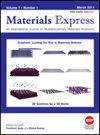Application of nano-insoles on functional recovery in early postoperative period in intertrochanteric femur fractures
IF 0.7
4区 材料科学
Q3 Materials Science
引用次数: 0
Abstract
This study investigates the effect of integrating family empowerment programs with the application of nanoinsoles on functional recovery in the early postoperative period in elderly patients with intertrochanteric femur fractures (IFF). A total of 100 elderly patients with IFF, who underwent internal fixation and were admitted to our hospital from November 2020 to October 2021, were selected and divided into an observation group (n = 50) and a control group (n = 50). The control group mainly received perioperative routine health-care education. The observation group received a family empowerment program and used nano-insoles prepared by carbon nanotube/silicone rubber composites during the perioperative period and before discharge. After postoperative follow-up, the care readiness of the main caregivers and hospitalization time were compared in the two groups. The scores of activities of daily living (ADL), Harris Hip Function Scale (HHS), Hospital Anxiety and Depression Scale (HADS), quality of life, satisfaction with care, and complications were recorded. The results demonstrated that the observation group exhibited significantly higher care readiness, nursing satisfaction rates, HHS, and ADL scores, as well as reduced hospitalization time and HADS scores compared to the control group. After 3 months post-surgery, the quality of life in the observation group was significantly superior to that of the control group. The incidence of complications in the observation group (8%) was significantly lower than that in the control group (24%). In conclusion, the family empowerment programs combined with the application of nano-insoles on patients with IFF can effectively improve postoperative functional recovery.纳米鞋垫在股骨转子间骨折术后早期功能恢复中的应用
本研究探讨了将家庭赋权计划与纳米鞋的应用相结合对老年股骨转子间骨折(IFF)患者术后早期功能恢复的影响。选取2020年11月至2021年10月在我院接受内固定术的100例老年股骨转子间骨折患者,分为观察组(50例)和对照组(50例)。对照组主要接受围手术期常规保健教育。观察组接受家庭赋权计划,并在围手术期和出院前使用由碳纳米管/硅橡胶复合材料制备的纳米鞋垫。术后随访时,比较了两组主要护理人员的护理准备情况和住院时间。记录两组患者的日常生活活动能力(ADL)、哈里斯髋关节功能量表(HHS)、医院焦虑抑郁量表(HADS)、生活质量、护理满意度和并发症评分。结果表明,与对照组相比,观察组的护理准备度、护理满意度、HHS 和 ADL 评分明显提高,住院时间和 HADS 评分也有所缩短。术后 3 个月后,观察组的生活质量明显优于对照组。观察组的并发症发生率(8%)明显低于对照组(24%)。总之,家庭赋权计划结合纳米鞋垫对 IFF 患者的应用可有效改善术后功能恢复。
本文章由计算机程序翻译,如有差异,请以英文原文为准。
求助全文
约1分钟内获得全文
求助全文
来源期刊

Materials Express
NANOSCIENCE & NANOTECHNOLOGY-MATERIALS SCIENCE, MULTIDISCIPLINARY
自引率
0.00%
发文量
69
审稿时长
>12 weeks
期刊介绍:
Information not localized
 求助内容:
求助内容: 应助结果提醒方式:
应助结果提醒方式:


